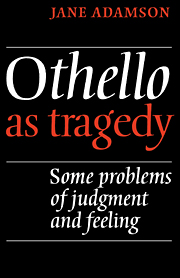Book contents
- Frontmatter
- Contents
- Preface
- Introduction
- 1 The ‘comforts’ of praise and blame
- 2 ‘Injuries’ and ‘remedies’: the first two acts
- 3 ‘Pluming up the will’: Iago's place in the play
- 4 Personal and professional identity: Othello in the first two acts
- 5 ‘Alacrity in hardness’: Othello's crisis in Acts III and IV
- 6 The ‘hollow hell’ of vengeance: Othello's attempted remedies
- 7 Self-charity and self-abnegation: the play's women in love
- 8 The ‘power to hurt’ and ‘be hurt’, ‘past all surgery’: the final scene
- Frontmatter
- Contents
- Preface
- Introduction
- 1 The ‘comforts’ of praise and blame
- 2 ‘Injuries’ and ‘remedies’: the first two acts
- 3 ‘Pluming up the will’: Iago's place in the play
- 4 Personal and professional identity: Othello in the first two acts
- 5 ‘Alacrity in hardness’: Othello's crisis in Acts III and IV
- 6 The ‘hollow hell’ of vengeance: Othello's attempted remedies
- 7 Self-charity and self-abnegation: the play's women in love
- 8 The ‘power to hurt’ and ‘be hurt’, ‘past all surgery’: the final scene
Summary
Like all readers of Shakespeare, I have been greatly stimulated, helped, provoked and incensed by the views of a great many critics. But I especially wish to acknowledge my two largest debts: a long-standing one to the work of L. C. Knights; and an immediate and extensive one to S. L. Goldberg's An Essay on ‘King Lear’ (Cambridge, 1974) – a more radically original book than its modest title may indicate, in its view not just of Lear but of Shakespearean tragedy generally, especially in what it suggests about the nature and function of characterization, about the connections between the characters’ experience and ours as we engage with the play, and about the argumentative requirements any interpretation has to meet. Neither has written much specifically on Othello, but the implications of their work on Shakespeare triggered my own thinking about why this play might in fact be far richer than the comparatively circumscribed one it is usually said to be. On Othello itself I owe most to A. C. Bradley and to F. R. Leavis, whose classic but contrary accounts keep pushing one back to the play to work out where each is right, why neither will do, and what they both ignore. On points of detail in the play I have inevitably found myself in agreement with dozens of critics, including many whose over-all sense of it differs from mine, though I have not generally noted such agreements; it seemed on the whole more useful to restrict the notes mainly to citing views different from mine and to acknowledging conscious debts.
- Type
- Chapter
- Information
- Othello As TragedySome Problems of Judgement and Feeling, pp. ix - xPublisher: Cambridge University PressPrint publication year: 1980



